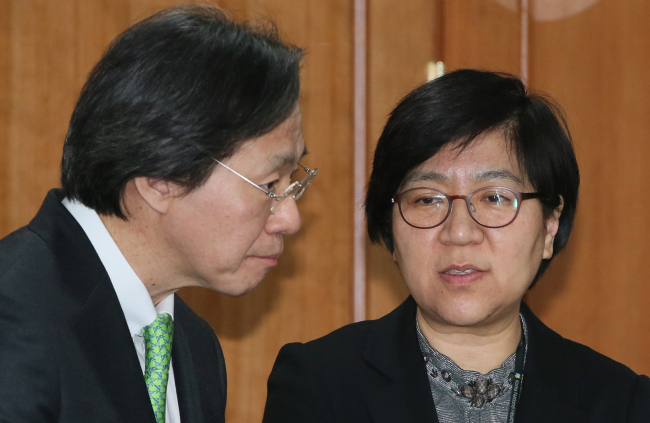Korea steps up Zika monitoring
Korea yet to release safe sex guidelines as Zika infection transmitted by sex reported in Texas
By KH디지털2Published : Feb. 3, 2016 - 16:03
The South Korean government on Wednesday released a set of measures to prevent the Zika virus, including plans to strengthen inspection of animal and plant imports as well as to research all mosquito species in the country.
Following a set of preventive measures released on Tuesday, including a plan to limit blood donations from travelers returning from Zika-affected regions, Korean authorities announced that all animal and plant imports will be inspected more thoroughly.
In particular, all lumber imports will be required to be sterilized as soon as they arrive in Korea, to prevent foreign mosquito larvae in trees from entering the country, they said.
Also, all medical facilities will be required to report to the authorities should they receive patients suspected of having Zika infection. All clinical specimans from patients suspected to have Zika must be submitted to the National Research Institute of Health for diagnosis. A special guideline will be published for doctors to help them deal with pregnant patients who have been infected with the virus.
A total of seven Koreans asked to be tested for possible Zika virus infection as of Wednesday. All their test results turned out negative.
The Health Ministry also announced that the presence of Aedes albopictus, better known as the tiger mosquito, an important carrier of the Zika virus, is minimal. From 2013 to 2015, a total of 910 of them -- an annual average of 303.5 mosquitoes -- were reported, accounting for 1.8 percent of all mosquitos in the country. However, the number of tiger mosquitoes have increased significantly from 71.5 mosquitoes in 2013 to 482.7 mosquitoes in 2015. Lee Wook-gyo from the Korea Centers for Disease Control and Prevention said the cause of this increase is not known.
“We currently have surveillance centers in 10 provinces nationwide,” Lee told The Korea Herald.
“In 2010, when we first established such centers for mosquito control, only three provinces had such agencies. In 2013, centers were established in six provinces, and 10 provinces in 2015. We need to accumulate more data in the next five years or so, to find out why the number of this specific mosquito is increasing.”
The World Health Organization on Monday issued a worldwide warning that the Zika virus -- transmitted through an infected mosquito -- is a global public health emergency that requires a unified response. The organization claimed the infection has been linked to cases of microcephaly, in which babies are born with abnormally small heads and underdeveloped brains.
Following a set of preventive measures released on Tuesday, including a plan to limit blood donations from travelers returning from Zika-affected regions, Korean authorities announced that all animal and plant imports will be inspected more thoroughly.
In particular, all lumber imports will be required to be sterilized as soon as they arrive in Korea, to prevent foreign mosquito larvae in trees from entering the country, they said.
Also, all medical facilities will be required to report to the authorities should they receive patients suspected of having Zika infection. All clinical specimans from patients suspected to have Zika must be submitted to the National Research Institute of Health for diagnosis. A special guideline will be published for doctors to help them deal with pregnant patients who have been infected with the virus.
A total of seven Koreans asked to be tested for possible Zika virus infection as of Wednesday. All their test results turned out negative.
The Health Ministry also announced that the presence of Aedes albopictus, better known as the tiger mosquito, an important carrier of the Zika virus, is minimal. From 2013 to 2015, a total of 910 of them -- an annual average of 303.5 mosquitoes -- were reported, accounting for 1.8 percent of all mosquitos in the country. However, the number of tiger mosquitoes have increased significantly from 71.5 mosquitoes in 2013 to 482.7 mosquitoes in 2015. Lee Wook-gyo from the Korea Centers for Disease Control and Prevention said the cause of this increase is not known.
“We currently have surveillance centers in 10 provinces nationwide,” Lee told The Korea Herald.
“In 2010, when we first established such centers for mosquito control, only three provinces had such agencies. In 2013, centers were established in six provinces, and 10 provinces in 2015. We need to accumulate more data in the next five years or so, to find out why the number of this specific mosquito is increasing.”
The World Health Organization on Monday issued a worldwide warning that the Zika virus -- transmitted through an infected mosquito -- is a global public health emergency that requires a unified response. The organization claimed the infection has been linked to cases of microcephaly, in which babies are born with abnormally small heads and underdeveloped brains.

Meanwhile, a case of Zika virus infection transmitted by sex -- not by a mosquito's bite -- was reported in Texas, U.S., on Tuesday. The South Korean government said it currently has no detailed plans to tackle the sexual transmission of the virus.
The WHO has cautioned governments about the possibility of sexual transmission of the virus, although this form of transmission has not been confirmed yet, according to the KCDC.
“All we can say for now is to avoid having sex with someone who has recently returned from the affected countries,” Hwang Young-soon from the KCDC told The Korea Herald. “Travelers who have returned from the affected regions should use protection for at least 30 days.”
By Claire Lee (dyc@heraldcorp.com)








![[Kim Seong-kon] Democracy and the future of South Korea](http://res.heraldm.com/phpwas/restmb_idxmake.php?idx=644&simg=/content/image/2024/04/16/20240416050802_0.jpg&u=)







![[KH Explains] Hyundai's full hybrid edge to pay off amid slow transition to pure EVs](http://res.heraldm.com/phpwas/restmb_idxmake.php?idx=652&simg=/content/image/2024/04/18/20240418050645_0.jpg&u=20240418181020)

![[Today’s K-pop] Zico drops snippet of collaboration with Jennie](http://res.heraldm.com/phpwas/restmb_idxmake.php?idx=642&simg=/content/image/2024/04/18/20240418050702_0.jpg&u=)